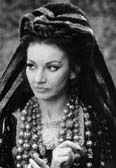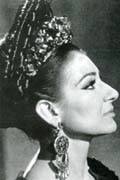My first experience with opera was rather traumatic at the age of four, when my mother took me to see Humperdinck's "Hansel and Gretel", which made me hate opera for years, but gave me my first and everlasting thrill for theatre.
And for many years I had mixed feelings about opera, especially the so-called comic performances like "Falstaff", where assumingly outdated jokes and ridiculous situations made me yawn while many people in the audience seemed to find reasons for a good laugh.
It was only when I heard her, her voice, the voice of "La Divina", Maria Callas that my whole attitude towards opera changed into a deep passion.
It was on April 2 in 1939, sixty-five years ago, when Maria Callas at the age of 16 made her  stage debut as Santuzza in a student production of "Cavalleria Rusticana", winning the Conservatoire's prize, marking the beginning of the career of one of the greatest and most versatile operatic singers in recent history. She sang an stage debut as Santuzza in a student production of "Cavalleria Rusticana", winning the Conservatoire's prize, marking the beginning of the career of one of the greatest and most versatile operatic singers in recent history. She sang an  incredible variety of roles; from Wagnerian to light coloratura; from high soprano to mezzo. But it is not just the range of roles she was capable of singing, but how she sang them that makes her special. She had a distinctive vocal timbre, which she could colour, in a seemingly infinite number of manners. incredible variety of roles; from Wagnerian to light coloratura; from high soprano to mezzo. But it is not just the range of roles she was capable of singing, but how she sang them that makes her special. She had a distinctive vocal timbre, which she could colour, in a seemingly infinite number of manners.
She could also act, a rarity with opera singers still today Everybody who has ever seen her in Pasolini's "Medea" will agree how this woman could convey a thousand different changing emotions just with the flick of an eyebrow, a turn of the head.
Sometimes I look at her photographs, especially at her eyes – and I think this woman had the face of all women in Greek Tragedy.
The press haunted her constantly and invaded her private life; the press all over the world covered her divorce from Menighini and her affair with Onassis. Her affair with Onassis was not only tragic to her personally, but also disastrous to her career. She contracted a throat disease, which caused her voice to lose quality, but she did not take it seriously. After Onassis' marriage to Jacqueline Kennedy, Maria broke down. She made several disappointing attempts to pick up her career, but never fully recovered before her death on the 16th of September 1977.
"Ho dato tutto a te!" Maria Callas gave all she had to opera. Her life, her heart and her soul.
Time for a night out in the opera?
|
